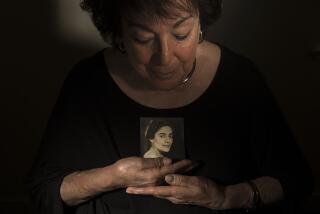Children’s Support Can Become Crutch
- Share via
Janet’s husband died a week before their 35th anniversary. At 63, she had thought of herself as a strong woman, but now she was desolate. She had difficulty getting up in the morning. How would she handle the finances? Should she remain in the house they bought together? What would she do on weekends? So many questions, so many details to attend to. They had done everything together and Janet couldn’t imagine going on without him.
Janet wrote to me for advice on how to handle her changing relationship with her grown-up children. They had been understanding and supportive after the death of their father. Now, six months later, Janet wonders if she has become too dependent upon them:
“I talk to them on the phone all the time and I need to be with them a lot. They have been wonderful about it, but I can see that I’m beginning to interfere with their families and their lives. It’s hard not to run to the children for company and to lean on them for help and advice. Are there any guidelines for this?”
Despair of Lost Dreams
The death of a spouse is one of the most devastating events that can happen in a lifetime. There’s usually unbearable grief, despair that dreams and plans for the future will never be realized, sudden but seemingly endless loneliness, and the awareness that one is no longer part of a couple that interacted with other couples.
The situation is complicated by the fact that the “inner child” in us reacts to death with enormous intensity. That inner child is the part of us that stores all the memories and feelings from our childhood. Among those feelings are the terror we felt about being lost or abandoned, the fear that Mommy and Daddy would die, the anxiety of being alone and helpless. For most people, the death of a spouse can bring these inner-child feelings to the surface so strongly that these emotions dominate their state of mind.
So people react both as mature adults who have suffered a tragic loss and as lost, needy children. In turning to their sons and daughters for comfort, they are in some degree reversing roles. Can such behavior become less than helpful? Can it, as Janet wonders, be overdone to the point of being harmful to both the children and the remaining parent? Yes, if it interferes with developing independence. I would suggest that Janet and others consider these guidelines:
Allowing Needy Child to Emerge
--It is natural to allow the scared, needy child inside you to emerge and to want to lean on people. These people can be “auxiliary life-support systems.”
--Recognize that the inner child of your son or daughter has also come forward, not just in reaction to his own loss, but in response to fear of losing his own independence. Recognizing this, you might be able to say, “I’ll need you close for a little while, and I’ll need help with a few things, but you needn’t be afraid because I want to get on my own two feet as soon as I can.”
--During the period when you need these auxiliary life-support systems, depend on a few people to fulfill that need--not just your children or one particular child.
--If your period of dependency lasts months or years, it is likely to be resented by your children as intrusive. It may also be bad for your own development. It means that you have allowed your inner child to take control to such a degree that you are becoming too passive and dependent to chart a new course. Weaning yourself from your children, though painful, will pay off in the long run.


